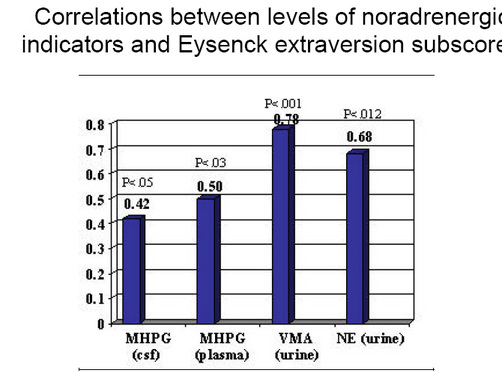The WAGER, Vol 4(22) – Extraversion & Noradrenergy
Building on a previous study, Roy, DeJong, & Linnoila set out to examine arousal in a small sample of pathological gamblers (n=17). Rather than focusing solely on personological or biological measures of arousal, the authors looked at both and sought correlations. Under carefully controlled conditions, members of the sample were administered a blood draw, urinalysis, and a lumbar puncture to obtain cerebrospinal fluid (csf). Samples were then analyzed for levels of several indicators of noradrenergic function: norepinephrine and its major metabolites (NE), 3-methoxyl-4-hydroxyphenylglycol (MHPG), and vanillylmandelic acid (VMA). The noradrenergic system is responsible for moderating arousal, the physiological response to stimulation. Subjects then completed the Eysenck Personality Questionnaire. The authors paid particularly close attention to the extraversion subscale of the Eysenck instrument, which has been linked to arousal. The scores from this subscale were then correlated with levels of the various biological indicators listed above. The chart below presents the effect sizes for all statistically significant relationships.

That several significant correlations were found suggests a relationship between pathological gambling and physiological arousal. No evidence, however, is provided for causation. The authors are careful to point out that levels of indicators of noradrenergic function could be a function of the subject’s ephemeral state at the time of analysis rather than being a function of the more permanent trait of pathological gambling. Much research has been conducted since the publication of the present study in 1989, and it is likely that the search for a biosocial model of pathological gambling will continue well into the next millennium.
Source: Roy, A.; DeJong, J. & Linnoila, M. (1989). Extraversion in pathological gamblers. Archives of General Psychiatry, 46, 679-681.
Goodbye…
The WAGER bids a fond farewell to Joni Vander Bilt, editor emeritus. Joni played a critical role in founding the WAGER, and should be credited with its continued success. We will miss her, and wish her the best of luck in her future pursuits.
This public education project is funded, in part, by The Andrews Foundation and the National Center for Responsible Gaming.